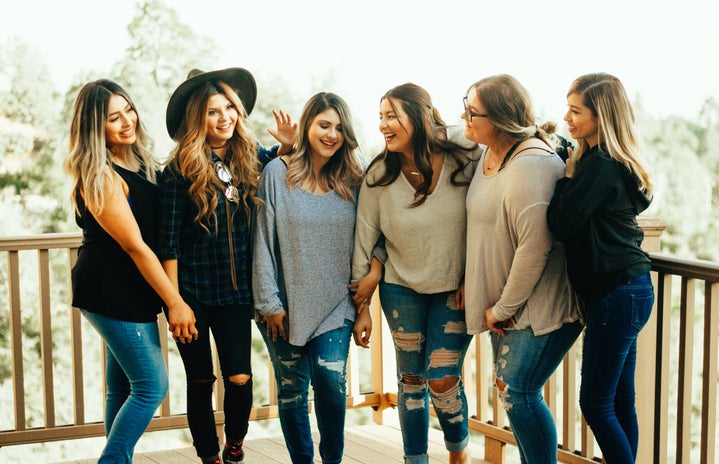“You know, just think of it like girl dating,” a friend jokingly assured me over the phone the night before sorority recruitment started.
I was an incoming sophomore during Fall of 2015 when I decided to rush a sorority. After previously transferring from a small arts college, I was eager to make friends and become involved on campus. My older sister had been involved with Greek life at Florida State University and most of my high school friends were obsessed with their houses and new friends. I wanted in, so I decided to give it a try.
Sorority recruitment is a stressful experience for every girl. It’s a game of matchmaking and first impressions. You are told to wear specific clothing, have your nails manicured and get your hair done, all while “being your true and authentic self.” While these standards are aimed to make the best possible first impression, one can’t help but feel insecure and uncomfortable at times.
But for me, it was more than hoping my foundation didn’t sweat off in the Florida heat. There was an elephant in the room when I told my friends and family that I wanted to rush. There was the constant fear that maybe some sororities actually did “creep too hard on your Facebook profile and judge you for it.” There was the endless question of whether or not I would find a house that not only fit my personality, but that also accepted me for being gay.
At every house I visited, I couldn’t help but wonder if they knew my secret. After all, all you had to do was Facebook stalk or Google me to see that I’m very involved with LGBTQ+ activism and journalism. Or if they had already planned to drop me because they thought I was weird. I could just hear someone saying, “She could never live in a sorority house! Sharing a room with her would just be awkward!” Even if I had a great conversation with a girl that I could see myself being friends with, I felt like a fraud.
After visiting three final houses during preference night, I cried on the phone to my older sister about which one was the best choice.
I was relatively familiar with my first house, and had some friends in it. I was told the previous semester that although everyone I knew was accepting of my sexuality, I would be unable to bring female dates to events if I decided to join. This was not meant to be offensive; it was simply part of their chapter’s regulations to encourage sisters to hang out with each other instead of bringing outside friends. However, I felt as if I was being robbed of the opportunity to be myself. So, I decided that I was looking for a different experience.
I felt very strongly connected to another house based on my personality and conversations, but I didn’t know anyone in the sorority. I was terrified that they wouldn’t accept me. So, I went with my gut and chose a more diverse sorority that had seemed genuine all week.
I ran home to my new house on bid day and met so many energetic and friendly people. I felt like I made the right choice. The new member process taught my pledge class the value of respect and sisterhood. However, still a stranger to over 300 girls, any conversation about cute boys at fraternity parties or upcoming date functions made me feel awkward. I know that no one was intentionally excluding me, but I felt that if I didn’t respond in a certain way that they would think I was weird or uncool.
During a new member convention, pledges were encouraged to develop a stronger community through a series of activities and discussions. I admired many of my new sisters for sharing stories about their personal struggles and finally felt as if I had the space to be honest with them.
That night, I came out to nearly 100 girls. I told them how nervous I was to join a sorority and how people always make assumptions about me just because I like to wear dresses and makeup. I confessed that I felt like I had to pretend to be interested in stereotypical Greek-associated events and the heteronormative culture. I even made a few jokes about how I will only ever view them as friends, so “don’t flatter yourselves, guys!”
I received nothing but love and admiration from people I barely knew. After the event, many girls told me that they admired how comfortable I was in my own skin, and that I was always welcome there. I learned that an older sister was a lesbian, and had even brought her girlfriend to some date functions. I knew that I had chosen the right house.
Although I ended up wanting a different kind of college experience than Greek life had to offer, I am so thankful that I joined a sorority for a period of time. I made so many memories and gained irreplaceable leadership and life skills. I was fortunate enough to be received positively by my sorority, but many college students that deviate from the norm still struggle. In fact, many of my LGBTQ+ friends at other universities have told me that they would never even considering rushing out of fear of what people might think.
Florida State University’s Panhellenic Association’s website explains that “below the surface there is natural beauty” and that they “believe in the power of women challenging and supporting each other through self-discovery in college, and throughout a lifetime.” The phrase “be your authentic self” is repeated again and again during rush week.
However, Greek communities in this country still have a long way to go in overcoming the stigma of your typical sorority girl. LGBTQ+ people should not have to fear the rush process and miss out on an opportunity to be a part of a strong campus community simply because they’re different. The message shouldn’t be ‘Now that you’re here, we will totally stand by you!’ it should be ‘No matter who you are, you have a space here. Come join us.’


